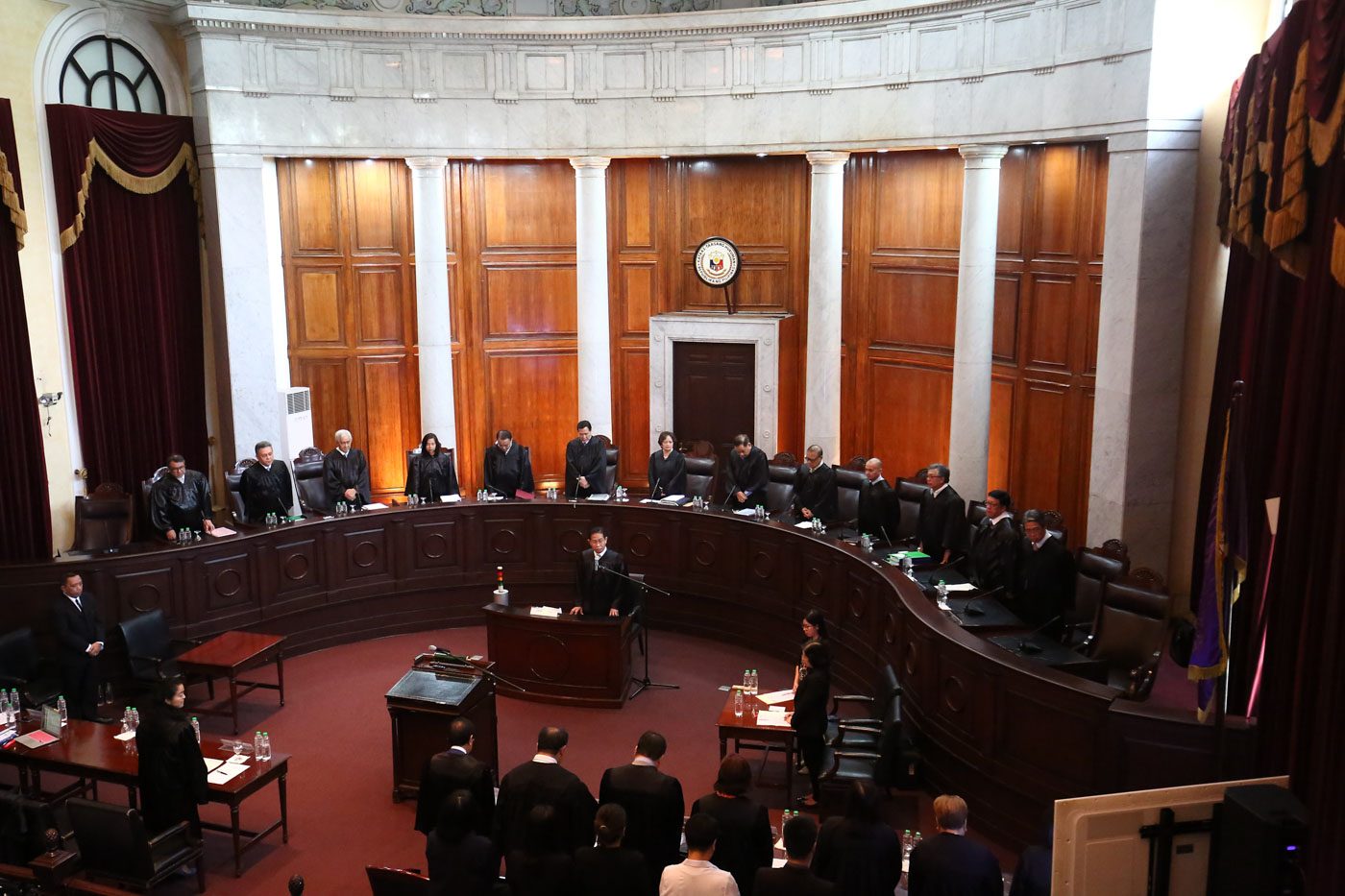SUMMARY
This is AI generated summarization, which may have errors. For context, always refer to the full article.

The Supreme Court’s 15-0 decision that junked the petitions challenging President Rodrigo Duterte’s unilateral withdrawal from the International Criminal Court (ICC) was based on mootness, but it has implications on the country’s international obligations.
For starters, University of the Philippines (UP) constitutional law professor Dan Gatmaytan said the ruling based on mootness “only looks benign” because the ICC case on drug war killings goes on despite the withdrawal.
“If there had been no case filed with the ICC, this would have been a catastrophe,” said Gatmaytan.
“The Supreme Court held that the petitioners had no standing to sue and the case is moot, and that would have left us with no way to hold the President accountable under the Rome Statute,” Gatmaytan added.
But because retired prosecutor Fatou Bensouda opened the preliminary examination in February 2018 before Duterte withdrew, the Rome Statute allowed that proceeding to continue. The Supreme Court even said in that decision that the Philippines still has obligations to cooperate despite the withdrawal.
But imagine if there was no case, “we would have been cut off from our ICC option,” said Gatmaytan, adding, “that would have been the end of it.”
The ICC’s pre-trial chamber is expected to come out with a decision by end of August if it would authorize investigation into killings in Duterte’s drug war, and killings by the Davao Death Squad.
Effect on death penalty
In the future, the Supreme Court provided three rules for presidents to withdraw from an international treaty. The first is that the treaty can be withdrawn if the president determines that the treaty runs afoul of the Constitution and Philippine laws.
That seems to have reversed the ways, said UP public international law professor Andre Palacios.
Palacios said that before, as reinforced by past Supreme Court decisions, when the Philippines adopts an international treaty, it can amend a domestic law such that the provisions of the treaty will be the one in effect.
But by saying that a treaty can be withdrawn if it runs afoul of the Constitution and domestic laws, Palacios said “the Court was very explicit that in case of a conflict between a treaty and a statute, the statute is pre-eminent and will prevail.”
“I need to take a closer look at that,” said Palacios, who chairs the Integrated Bar of the Philippines (IBP) international law committee, which filed one of the three petitions challenging the withdrawal.
That the Constitution prevails over international obligations is the position of the Duterte government in pushing for the death penalty. During House committee deliberations, the Department of Justice (DOJ) said that the Constitution allows the death penalty “for compelling reasons involving heinous crimes.” (Section 19, Article III)
Those opposing the measure cite Article 1 of the 2nd protocol of the International Covenant on Civil and Political Rights (ICCPR), which explicitly bans execution. The Philippines is a state party to the 2nd protocol.
“But we can’t adopt a position that would imply that our Constitution can be amended by treaties or conventions,” Justice Assistant Secretary Nicholas Felix Ty said during a House hearing in August 2020.
Will the ICC ruling be used to support the push for the death penalty?
“We have always been worried about this ineffective and counterproductive measure,” Human Rights Commissioner Karen Gomez Dumpit told Rappler.
Dumpit said, however, that the second optional protocol has no opt out provision.
“We still maintain the position that there is no opt out provision in the Second Optional Protocol aiming at the abolition of the death penalty. International Law will be unaffected by any domestic action whether to withdraw from the protocol and/or reintroduce the death penalty,” said Dumpit.
Dumpit also said that to withdraw and even skirt the ICCPR will result in the Philippines losing its good standing in the international community.
“There will be implications on trade agreements like the GSP+ putting at stake the industries and communities, benefiting from this program,” said Dumpit.
Remedies
The Supreme Court said that as a third rule, the President cannot withdraw from a treaty if the Senate has expressly declared that their concurrence is needed for it to push through.
There was a pending resolution to that effect in the Senate, but it was blocked in February 2017 by Senator Manny Pacquiao, then a staunch ally of Duterte and now a foe as feuding party mates in PDP-Laban fight for supremacy in the 2022 elections.
But according to both Gatmaytan and Palacios, even if the minority senators get the Senate to pass a resolution and include it in their motion for reconsideration, it would barely change a thing.
“The Court keeps saying that the case is moot because everything that needs to be done to withdraw was done in accordance with law. A Senate resolution will not change that,” said Gatmaytan.
“[A Senate resolution] I think would not by itself change the ruling of the Court because as explained in their reasoning, it’s really mootness, and mootness means there’s no longer any controversy. The thing you wish to prevent had already happened,” said Palacios.
Gatmaytan said it’s possible for the next president to rejoin the Rome Statute after Duterte steps down from office in 2022, if only to give back to the Philippines the insurance against impunity that the ICC provides.
“But what if Duterte allies win the Presidency?” Gatmaytan asked.

– Rappler.com
Add a comment
How does this make you feel?
![[PODCAST] Law of Duterte Land: ICC hopes alive in Supreme Court ‘loss’](https://www.rappler.com/tachyon/2021/07/Law-of-DuterteLand-PROMO-sq.jpg?fit=449%2C449)





There are no comments yet. Add your comment to start the conversation.